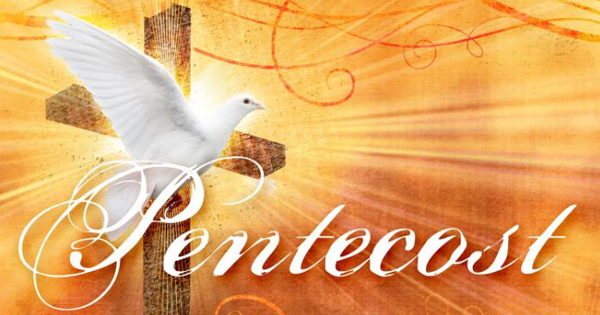|
|
Shalom Chaverim (Friends),
Greetings from the Land of Israel & Chag Shavuot Sameach! (Happy Festival of SHAVUOT! This ancient harvest festival, called Shavuot (Hebrew: שבועות) (Weeks) - more commonly known in the Christian Church as PENTECOST - begins tonight!
Torah Readings: Exodus 19:1 – 20:23, Ezekiel 1:1-28, 3:12, John 1:32-34, Matthew 3:11 – 17 and the Book of Ruth
|
|
SPIRIT AND TRUTH
The festival of Shavuot is one of the most amazing and wonderful of God’s appointed times (moadim); since on this day God gave us not just one, but two of His most precious gifts: The Torah and the Spirit.
Yeshua promised that there would come a day when true worshipers would worship God - in Spirit and in Truth. These are the kind of worshipers God is seeking. (John 4:23)
We need both Truth and Spirit. I’ve heard it said,“If we have only the Word we dry up; if only the Spirit we blow up; but if we have both the Word and the Spirit we grow up.” How true! |
|
THE ANCIENT ORIGINS OF PENTECOST
The Torah is the Word of Truth (D’varEmet); but it is the Spirit that gives
us the grace to live out that Truth in our daily lives. God said to the nation of Israel, “And I will put my Spirit in you and move you to follow my decrees and be careful to keep my Torah.” (Ezekiel 36:27)
While many Christians celebrate Pentecost as the time of the ‘pouring out of the Holy Spirit upon the church’; many do not realize that this special day originated in the ancient biblical festival of Shavuot (meaning‘ weeks’ in Hebrew).
So how can we understand the ancient Jewish roots of Pentecost? What is Shavuot all about? |
|
1. HARVEST FESTIVAL
Shavuot marked the wheat harvest and the bringing of the firstfruits to the Temple, therefore one of the other names for this festival is Chag Hakatzir (Festival of the Harvest). It is, in a prophetic sense, God's 'appointed time' to gather in the spiritual harvest of souls into His Kingdom.
Yeshua said to his disciples, “The harvest is plentiful but the workers are few. Ask the Lord of the harvest, therefore, to send out workers into his harvest field.” (Matthew 9:37-38)
Let us go out on Shavuot, as did Yeshua & His disciples, proclaiming the good news of His Kingdom, healing the sick, casting out demons; having compassion on people who are harassed, helpless and hopeless - like sheep without a shepherd . |
|
2. Giving of the Torah (Matan Torah)
Traditionally, Shavuot is considered the time of the giving of the Torah at Mt. Sinai. If Passover (Pesach) was the birth of the nation of Israel, then Shavuot is its Bar Mitzvah - its coming of age . Seven weeks after their miraculous exodus from Egypt, Israel received the Torah at Mt. Sinai, which meant not only accepting the privilege but also the responsibility to live as God’s set apart (holy/kadosh) people.
The Torah became the agreed upon standard of behavior or code of conduct for both the native born Israelite and the stranger who came to join them. “One law (torah achat) and one custom shall be for you and for the stranger who dwells with you.” (Numbers 15:16) |
|
A Bar Mitzvah boy at Kotel holding Torah scroll
|
|
THE BRIDEGROOM AND THE BRIDE
The Torah, far from being a legalistic directive handed down to Moses from the mountain top, this Divine encounter between God (The Bridegroom) and His people Israel (The Bride), contains many elements of a traditional Jewish wedding ceremony, including the chuppah (marriage canopy), ketubah (marriage contract), shofar, wedding ring and wedding gift.
* The cloud covering represented the Jewish wedding canopy – the chuppah
* The shofar call announced the arrival of the Bridegroom
* The Ketubah – the Marriage contract outlining privileges and responsibilities of each party
* The vows – All the people of Israel said, “I do!”
* The wedding ring (special sign of betrothal) – 7th day Sabbath
* The wedding gift to the Bride – the Land of Israel |
|
A LIGHT TO THE NATIONS
Now that God has given us the Torah, He has entrusted us with a sacred mission – to spread the light of Torah to all the nations. The message of Shavuot is that we are significant; we have been chosen, appointed, and anointed to promote God’s purposes in this world.
We have each been given a holy calling to bring more love, peace, kindness, and justice to this world – to be a shining light in the midst of a dark and perverse generation. When we understand and come to realize that we have actually been selected by God to reveal His beauty, goodness, mercy and other wonderful attributes to the world, then we have discovered the secret to a truly meaningful and fulfilling life.
Yeshua’s final words to us were to go and make disciples of all the nations,teaching them all God has commanded us in the Torah. Let us fulfill that holy commission in the power of the Holy Spirit. “Go and make disciples of all nations, immersing them in the mikvah in the name of the Father (Av) and Son (Ben) and Holy Spirit (Ruach Hakodesh), teaching them to observe all the things I have commanded you……..” (Matthew 28:19-20) |
|
DAY OF PENTECOST - The Holy Spirit gives life
Before we can 'go', however; we must wait - wait to receive the Holy Spirit (Ruach Hakodesh). We simply cannot be a light and witness for the Lord without the power of the Holy Spirit .
Most Christians are more familiar with the Greek name of Shavuot - ‘Pentecost’ – from the word ‘pente’, which means fifty (50). After they had counted seven weeks, it was on the fiftieth day (which represents the year of Jubilee & freedom) when the Holy Spirit fell upon the Jewish people (and those who joined them) who were waiting in the upper room.(Acts 1:13-14)
Yeshua told his disciples not to leave Jerusalem, but to wait for the baptism of the Holy Spirit which the Father had promised. (Acts 1:4,5 &8) |
|
"When the day of Shavuot came, they were all together in one place.Suddenly a sound like the blowing of a violent wind came from heaven and filled the whole house where they were sitting. They saw what seemed to be tongues of fire that separated and came to rest on each of them. All of them were filled with the Holy Spirit and began to speak in other tongues as the Spirit enabled them." (Acts 2:1-4)
|
|
|
HOW TO CELEBRATE SHAVUOT?
Now that we understand more about Shavuot and its relationship to Pentecost, how can we celebrate it? When the people of Israel were exiled from the Land, they could no longer celebrate Shavuot as a harvest, agricultural festival; therefore we lost a 'hands-on' way of celebrating the festival of Shavuot.
For Passover, we have the ritual seder meal; for Sukkot we build little, flimsy booths; for Chanukah we light candles each night - but for Shavuot - what??
On Shavuot, ritual and ceremony has been replaced by 'The Word' - a time to glorify and honor the revelation of the Word of God through the Torah. Many Jewish communities around the world observe the custom of staying up all night to read and study the Torah. |
|
| Reading from the Torah Scroll |
|
As Bible-believing followers of Yeshua Hamashiach (the Messiah), we remember that Yeshua is the 'Living Word' that became flesh and dwelt among us (John 1:14). He is the 'living Torah' and we honor Him when we honor the Word.
When we receive Yeshua we are set free from bondage to the Kingdom of darkness, just as the Israelites were set free from Egypt; but we still need to make that essential pit stop to receive the Torah and commit to living according to God's word. |
|
SHAVUOT CUSTOMS
Other customs on Shavuot are to eat dairy products, especially cheesecake and blintzes. In Israel we celebrate with picnics, eating the fruit of the Land; and enjoying the beautiful spring. Girls often wear a crown of flowers in their hair called a 'zer prachim'. As Messianic believers we hold nation-wide gatherings to pray, praise and worship Adonai in Spirit and Truth. |
|
LESSONS FROM THE BOOK OF RUTH
In addition to the Shavuot readings, we also study the Book of Ruth because of its connection to the harvest, Ruth, the Gentile, Moabite, daughter-in law of Naomi, gleaned in the fields of Boaz because of the Torah commandment to leave the corners of the fields for the poor to gather.
The story of Ruth is so rich in prophetic meaning for the Church regarding their relationship with Israel and the Jewish people. |
|
In a nutshell, Naomi represents the Jewish people who left the land, lived in exile, and lost their entire families there (in the Holocaust). They have returned with nothing but bitterness and sorrow.
Ruth and Orpah, Naomi’s two Gentile daughters- in- law represent the two types of the Christian Church – one who agrees to abandon Naomi in her time of need; and the other who refuses to leave her. Ruth pleads with her mother-in-law to be allowed to stay with her even until death
Boaz represents our Kinsmen-Redeemer, Yeshua Hamashiach (the Messiah). Ruth came back to Israel with her Jewish mother in law, Naomi, and vowed to her, “Your people will be my people and your God my God.” (Ruth 1:16)
Ruth gleaned in the fields of Boaz, her ‘kinsmen redeemer’, who represents Yeshua, our Redeemer. When Ruth asked why he had taken special notice of her, a foreigner, Boaz replied, “It has been fully reported to me the kindness you have shown to your mother in law…” (Ruth 2:11)
|
|
Thank you so much (todah rabah) for standing faithfully with us and all Israel in your prayers and generous giving. You are people who, like Ruth, have said, "Your people will be my people and your God my God."
And so I pray that our Redeemer, Yeshua the Messiah, will notice your kindness and generosity and give you your full reward:
"May the Lord repay you for what you have done. May you be richly rewarded by the Lord, the God of Israel, under whose wings you have come to take refuge.” (Ruth 2:12) |
|
Giving of First-Fruits (Bikkurim)
Shavuot was one of the appointed times for the people to bring their First-fruits (Bikkurim) offerings to the Temple. No one was to appear empty handed.“Three times a year all your men must appear before the LORD your God at the place he will choose: at the Festival of Unleavened Bread, the Festival of Weeks (Shavuot) and the Festival of Tabernacles. No one should appear before the LORD empty-handed: Each of you must bring a gift in proportion to the way the LORD your God has blessed you.” (Deuteronomy- 17)
To give a special Shavuot festival offering on-line through paypal, click on the donate button below: |
|
May your Shavuot be filled to overflowing with the Spirit of the Living God, His power, His love, His mercy and forgiveness. And may we extend that same grace, out of gratitude for all He has blessed us with, to those around us.
Shalom and Chag Shavuot Sameach (happy Shavuot) ! |
|
 |
Israeli children holding Torah & celebrating Shavuot, photo: Israel Today
To read the full study on Shavuot CLICK HERE
For Shavuot study questions CLICK HERE |
|
|
|
















No comments:
Post a Comment